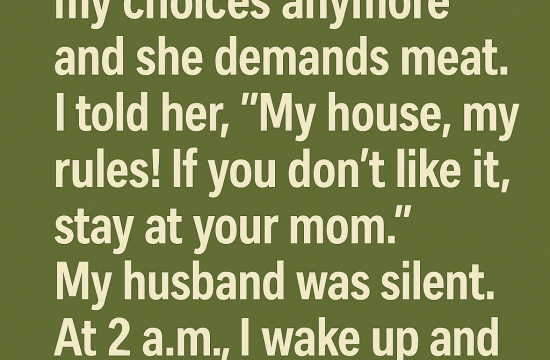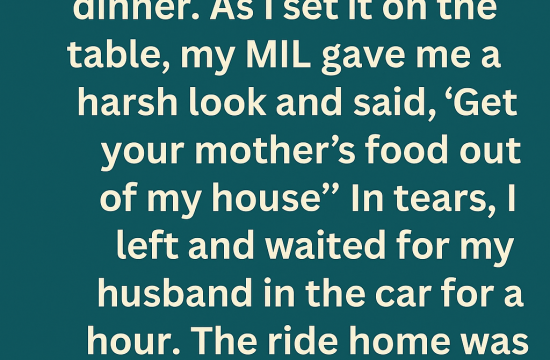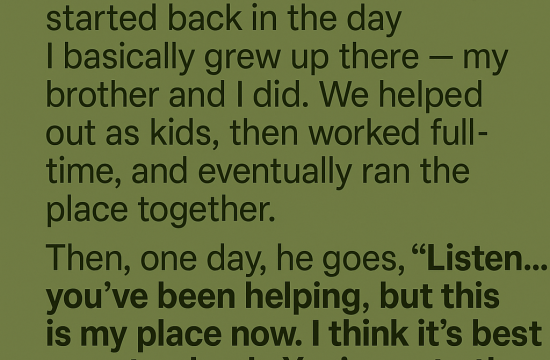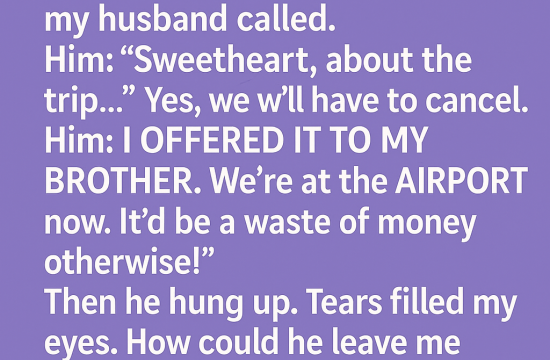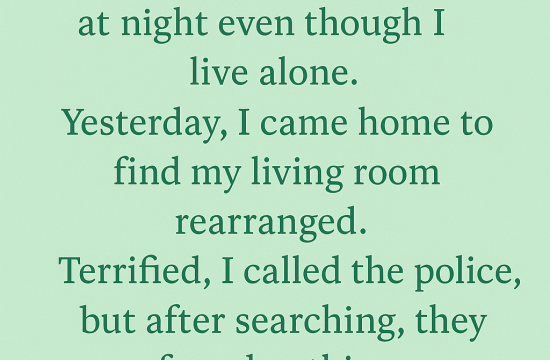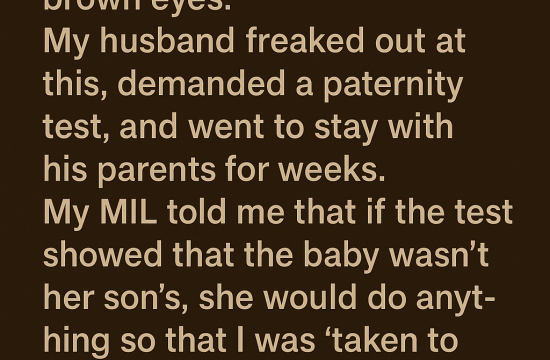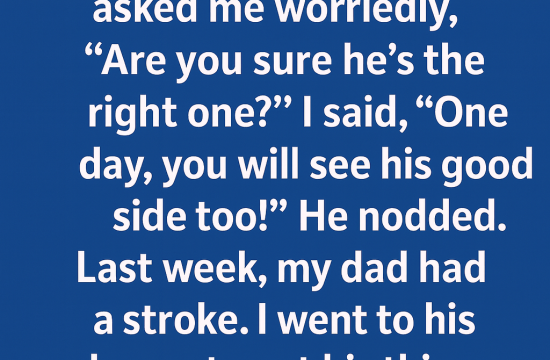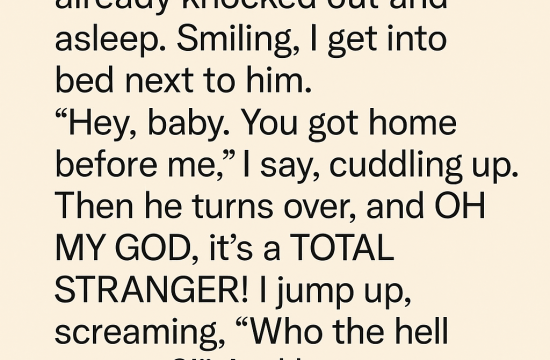My daughter, Lily, had only recently begun feeling confident again after years of struggling with a visible limp from a childhood injury. When my fiancée Rachel’s family invited us over for dinner, I asked her to please tell them not to mention it. Lily had been through enough.
Dinner started out fine—until Rachel’s father, Franklin, smirked and said, “You’re not walking like that at the wedding, right?”
The table went still. I could feel the fury rising in my chest. I turned to Lily and whispered, “Do you want to leave?” She nodded. But then, she stood up, looked him dead in the eye, and said:
“I’ll walk however I want—and I’ll still be better than you.”
You could hear a pin drop.
Rachel turned pale. Her mother looked like she wanted to disappear. I reached for Lily’s hand, but she shook her head and stood taller, even as pain flickered across her face with every second on her feet.
Franklin looked stunned—then furious. “That’s no way to talk to an elder,” he snapped, slamming his fork down. The sheer audacity of him doubling down instead of apologizing left me speechless.
I turned to Rachel, waiting for her to say something. She didn’t. Just stared at her napkin like it held the answer to world peace.
Lily’s voice broke the silence again. “I thought you were all kind. I thought you’d care how I felt. I was wrong.”
Rachel’s little brother Adrian squirmed in his seat, looking like he might cry. Rachel’s mom, Harriet, whispered, “Franklin, that was uncalled for.”
He rolled his eyes. “She needs to hear the truth.”
That was it. I stood up, grabbed Lily’s bag, and said, “We’re done here.”
As we reached the door, Rachel finally said, “Wait… don’t go. He didn’t mean it.”
I turned to her, my voice low. “If he didn’t mean it, he wouldn’t have said it. And you just sat there.”
She reached out, but I stepped back. I needed distance.
As we walked down the quiet suburban street, I tried to hold it together. In the car, Lily turned to me with tears in her eyes.
“Dad… do you still want to marry her?”
That question crushed me.
That night, I lay awake thinking. About Franklin’s cruelty. About Rachel’s silence. And about Lily’s bravery. I had promised myself I’d protect her from anyone who made her feel small.
The next morning, Rachel called. I ignored it. Then a text: “Please, can we talk?”
Instead, I called my older sister Bernice—who’d always been blunt and wise.
After I told her everything, she asked, “Do you still love Rachel?”
I paused. “I don’t know anymore.”
She said, “Love should make you stronger, not weaker. And it should make Lily feel safer, not more alone.”
Later that day, Rachel showed up unannounced. She looked wrecked. “I didn’t know he’d say that,” she said. “I should’ve defended her.”
“Why didn’t you?” I asked.
“I was scared of making it worse.”
That hit me hard. She’d been more afraid of awkwardness than of Lily’s pain.
“I can’t marry someone who won’t protect my daughter,” I said.
She pleaded, “I love you. I love Lily.”
But love isn’t just a feeling—it’s what you do with it.
“I need time,” I told her, and closed the door.
Inside, Lily asked, “Are you gonna leave her?”
“I don’t know. But I do know—I’ll always choose you.”
She smiled through her tears, and that night we watched silly cooking videos until we both fell asleep on the couch.
Rachel kept texting. Then one stood out:
“I told my dad what he said was wrong. He won’t apologize. But I stood up to him.”
It was something. But not enough.
Lily deserved more than effort—she deserved security.
A week later, Rachel asked to meet for coffee. I agreed.
She’d been talking to a counselor. She said she wanted to change.
I believed her. But I said, “Lily can’t be your test run. She deserves someone who’s already ready.”
Tears filled her eyes. “So this is it?”
I nodded. “Yes. I’m sorry.”
Walking out felt like a breakup with a future I once imagined. But when I got home and Lily threw her arms around me, I knew I’d made the right choice.
Over the next few months, Lily thrived.
She joined the art club. Made a new friend, Desmond, who didn’t care one bit about her limp. She even started running again—her gait uneven, her grin unstoppable.
One day at the grocery store, I ran into Franklin.
“How’s Lily?” he asked stiffly.
“She’s doing great.”
“I didn’t mean to upset her.”
I looked him in the eye. “Words matter—especially to kids. You can’t take them back.”
He nodded, but I didn’t need his apology anymore. We were free.
A week later, Harriet sent a letter apologizing. Inside was a small watercolor painting of lilies and daisies. At the top, it read: “Stay Strong.”
Lily tacked it to her bulletin board.
Months passed. Lily volunteered at an animal shelter. She auditioned for a school play and walked proudly across that stage. The crowd stood and cheered, and I nearly burst with pride.
Then, one afternoon at the dog park, we met Renata.
She had a little boy named Emil, born with a birthmark that covered half his face. Where others stared, Renata smiled. And Lily noticed.
We became friends. Then more than friends.
One day at a diner, someone made a rude comment about Emil. Renata calmly said,
“I hope one day you learn to see more than skin.”
Then helped Emil color his placemat like nothing happened.
Lily whispered to me, “She’s brave.”
That’s when I knew.
A year later, I proposed to Renata—at the same park where we met. Lily and Emil by our side.
At our wedding, Lily walked down the aisle proudly. Limp and all. There were whispers—but only for a second. Because love drowned them out.
When I said “I do,” I was marrying not just Renata—but a life that honored Lily’s worth.
In the end, Franklin’s cruelty led me to a life I didn’t know I deserved.
A life where Lily never had to shrink herself.
A life where love stood tall—with a limp, with a smile, with pride.




